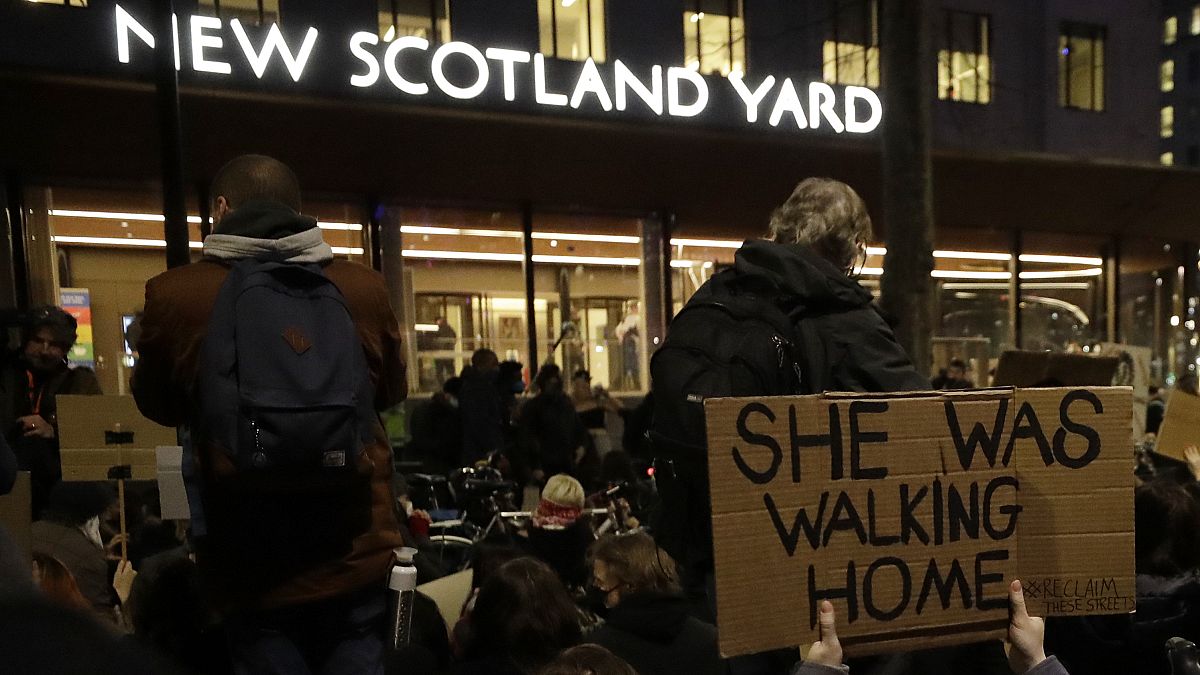The government has come under fire with its proposed crime bill which detractors say does little to tackle violence against women and girls as the country reels from the murder of Sarah Everard.
Vigils and demonstrations were held across the UK on Monday evening to remember Sarah Everard and denounce growing police protest powers.
Hundreds of people attended a vigil in central London on Monday evening, blocking Whitehall — where the Parliament is located — and gathering outside New Scotland Yard.
Other events were also planned in other major cities including Birmingham, Edinburgh, Leeds and Liverpool with protesters also denouncing a planned legislation currently going through Parliament that would grant police more powers to clamp down on protests.
Everard, 33, disappeared on March 3 as she walking home from a friend's house in South London. She was confirmed dead 10 days later following the discovery of a body in woodland in Kent. A serving police officer was arrested and charged for her abduction and death.
Her killing has prompted much soul-searching in the UK with many women sharing their own experiences of being threatened while walking outside on social media.
It has also led to much criticism of the police after footage from an unauthorised vigil in south London on Saturday showed officers handcuffing and removing women from crowds. Home Secretary Priti Patel has demanded a review of what happened, describing the images as "upsetting".
It has also intensified scrutiny of the Police, Crime, Sentencing and Courts Bill which would enable police to impose harsher conditions on static protests and marches including start and finish times and maximum noise levels.
Metropolitan Police Commissioner Cressida Dick said the legislation is needed "specifically to deal with protests where people are not primarily violent or seriously disorderly" but have "an avowed intent to bring policing to its knees and the city to a halt".
Reclaim These Streets, the campaign mounted in memory of Everard which organised the first vigil, said on the matter: "How can anyone look at what happened on Saturday night and think now is the time for the police to have more powers?"
Sisters Uncut, a feminist group campaigning against domestic and sexual violence, criticised the police as "institutionally violent against women" in a statement on Monday and argues the new bill "will increase" violence against women.
"The current 'tough on crime' approach does nothingto improve the lives of victims of violence, and it protects police officers from accountability," it added.
The main opposition Labour party has also said it would oppose the bill. It said that under the bill, the maximum jail sentence for rape would be five years but it would be ten years for someone found guilty of attacking a statue.
"In the 20 schedules, 176 clauses and 296 pages of the Conservatives' Police, Crime, Sentencing and Courts Bill, "women" are not mentioned even once," Shadow Secretary of State for Justice, David Lammy, wrote in a statement.
"This is a missed opportunity to tackle violence against women and girls that has become endemic in the UK," he added.
The government argues however that the bill will better protect women and children from sexual abuse.
Prime Minister Boris Johnson also chaired a meeting of the government's Criminal Justice taskforce on Monday evening to discuss further ways of improving women's safety.
He said the government would bring in legislation to toughen up sentences and put more police on the streets. A pilot project of officers in plain clothes stationed undercover to patrol bars and clubs will be expanded across the country. Downing Street also announced it would double its Safer Streets fund, which will include money to improve street lighting and install more CCTV cameras.
